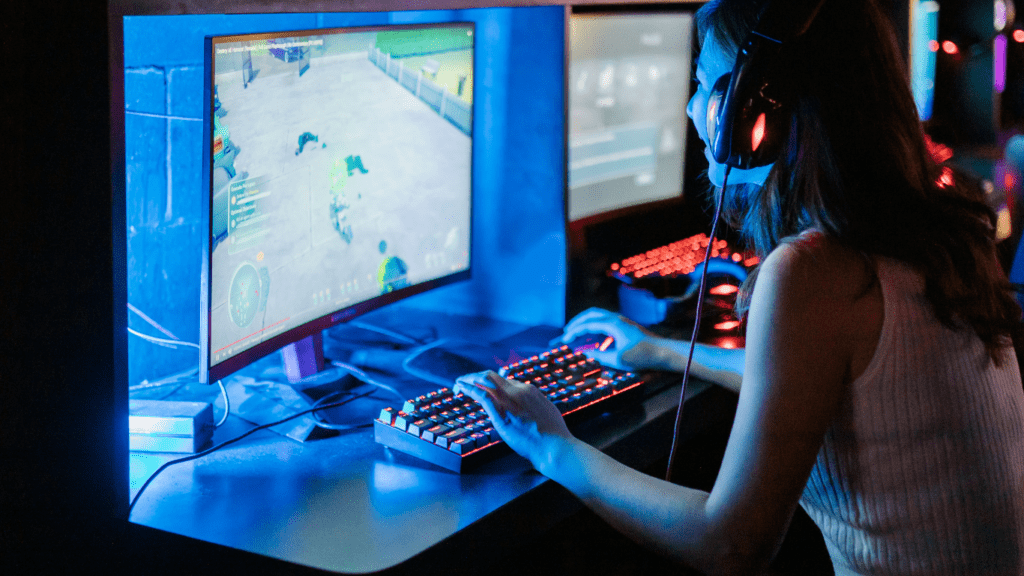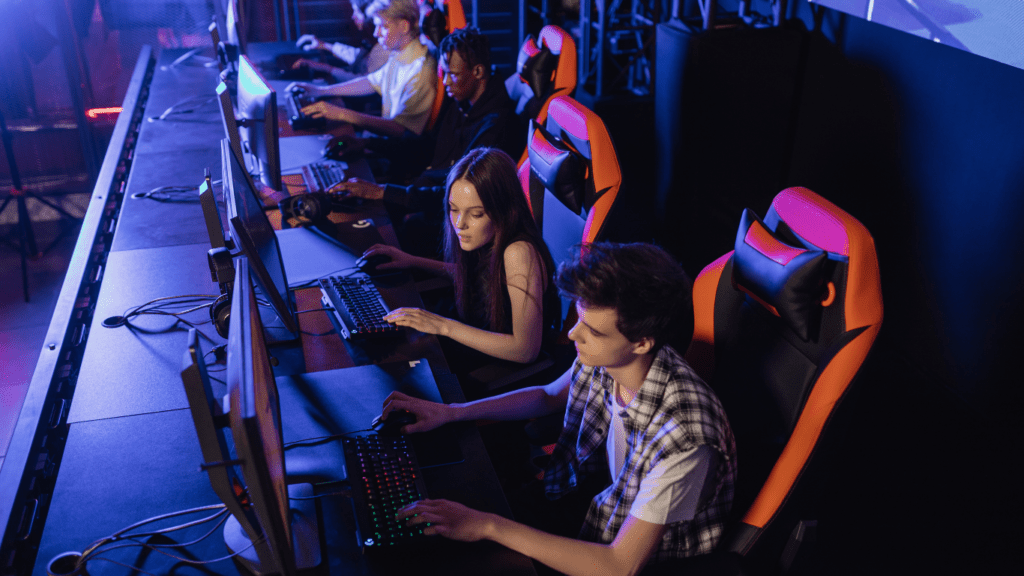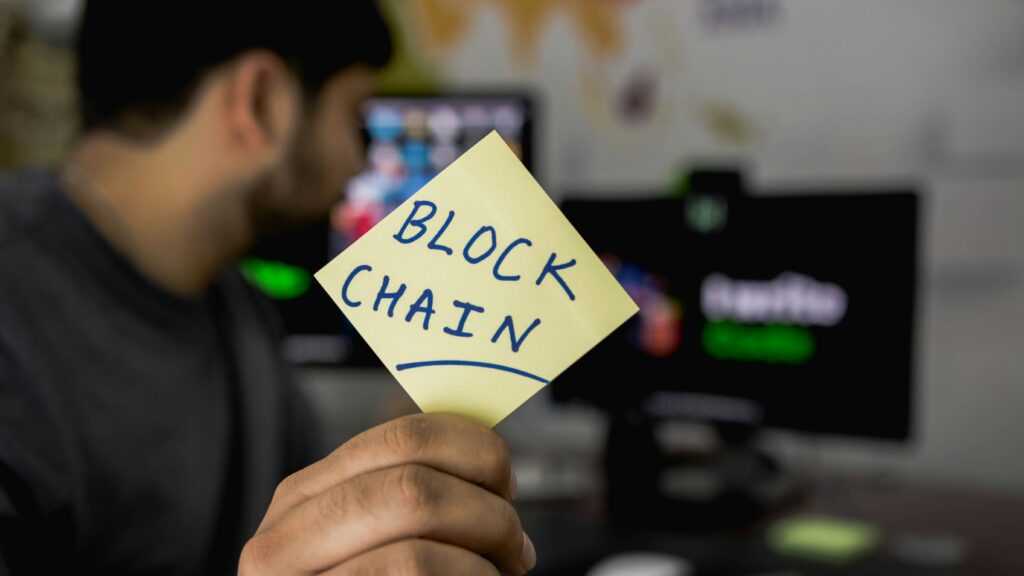Understanding Blockchain Technology
Blockchain provides a secure and transparent method for verifying transactions, with vast applications in various industries, including gaming.
What Is Blockchain?
Blockchain is a distributed ledger technology. It records transactions across multiple computers to ensure data integrity. For gaming, blockchain offers decentralized data management, enhancing both security and transparency.
Each transaction is verified by network nodes, making unauthorized changes virtually impossible. For example, in-game asset ownership can be tracked and validated without a central authority.
Key Features of Blockchain
- Decentralization: Unlike traditional systems, there’s no single point of failure. For example, game assets exist independently of any one server.
- Transparency: All transactions are publicly visible. Players can verify asset integrity, ensuring fair play.
- Immutability: Once entered, data cannot be altered. Gamers can trust that their in-game achievements are permanent and verifiable.
- Security: Cryptographic techniques protect data. Unauthorized access and fraud are minimized, boosting player confidence.
These features of blockchain form the foundation for integrating this technology into gaming, making transactions more secure and transparent.
The Evolution of Gaming
The gaming industry has seen significant growth, transforming from simple pixel graphics to complex, immersive worlds. Let’s explore this evolution further.
Traditional Gaming Ecosystem
Initially, gaming involved dedicated arcade systems and home consoles. These platforms required physical cartridges or discs to play games. Notable examples include the Atari 2600, NES, and Sega Genesis.
Early games were often linear, offering limited player interaction beyond predefined paths and goals. Multiplayer experiences were rare, usually necessitating physical presence around the same console. Developers had complete control over game assets and distribution, limiting secondary markets for users.
Online and Mobile Gaming Trends
With the advent of the internet, online gaming gained popularity. Examples include multiplayer games like Quake and Ultima Online. Players could connect remotely, leading to massively multiplayer online games (MMOGs) such as World of Warcraft.
The rise of smartphones further revolutionized gaming with mobile platforms. Titles like Angry Birds and Clash of Clans exemplify mobile gaming’s widespread reach.
These trends increased game accessibility, allowing people to play anytime, anywhere. Microtransactions and downloadable content (DLC) became significant revenue streams, changing the economic model. Social gaming on platforms like Facebook also gained traction, highlighting the shift towards more interactive and connected gaming experiences.
How Blockchain Is Transforming Gaming
Blockchain technology is altering the gaming landscape by introducing decentralization, smart contracts, and enhanced security. These innovations offer unique benefits to gamers and developers.
Decentralization in Gaming
Blockchain decentralizes gaming, removing the need for intermediaries. Gamers directly interact with game content and other players. Decentralized marketplaces let users buy, sell, and trade in-game assets securely. For instance, platforms like OpenSea allow trading of digital collectibles and NFTs, giving players control over their items.
Smart Contracts and In-Game Transactions
Smart contracts automate and secure transactions in gaming. When conditions are met, transactions execute without human intervention. Players can purchase assets, participate in events, and complete missions transparently. For example, games like CryptoKitties use smart contracts to manage the breeding and trading of virtual cats.
Enhanced Security and Transparency
Blockchain enhances security and transparency in gaming. Transactions recorded on an immutable ledger prevent tampering and fraud. Players can verify the authenticity and scarcity of their in-game assets. This transparency builds trust. Games like Axie Infinity use blockchain to ensure fair gameplay and secure asset ownership, providing a reliable gaming environment.
Popular Blockchain-Based Games
Blockchain games are transforming the gaming landscape by offering unique, decentralized experiences. Many of these games allow players to own in-game assets securely and trade them freely.
Case Study: CryptoKitties
CryptoKitties, launched in 2017, is one of the first successful blockchain-based games. Players collect, breed, and trade virtual cats, each represented as a unique non-fungible token (NFT) on the Ethereum blockchain.
The game’s transparent and secure nature ensures that each CryptoKitty is unique and verifiably owned by a player. According to data from CryptoKitties’ stats, some rare CryptoKitties have sold for over $100,000. This showcases the potential value and demand for digital assets in blockchain gaming.
Case Study: Decentraland
Decentraland is a virtual reality platform powered by the Ethereum blockchain where users create, experience, and monetize content and applications. Users purchase virtual land parcels using MANA, Decentraland’s cryptocurrency, and build anything from static 3D scenes to interactive applications and games.
The platform operates on decentralized governance, allowing users to propose and vote on platform policies. Data from DappRadar shows that Decentraland has thousands of active users daily, highlighting the growing community and economic activity within the virtual world.
| Game | Blockchain | Unique Feature | NFTs Value |
|---------------|------------|---------------------------------------|------------|
| CryptoKitties | Ethereum | Digital cats collection and breeding | $100,000+ |
| Decentraland | Ethereum | Virtual land and content creation | Variable |
These case studies illustrate the transformative potential of blockchain in gaming, from creating unique digital assets in CryptoKitties to offering immersive virtual worlds in Decentraland. Blockchain technology continues to evolve and shape the future of gaming, attracting both developers and players.
Benefits and Challenges
Blockchain technology offers unique advantages to both gamers and developers, but it also faces several potential roadblocks and criticisms.
Advantages for Gamers and Developers

Blockchain revolutionizes the way gamers and developers interact. Gamers gain true ownership of in-game assets, which can be traded, sold, or used across multiple games. For example, players can sell rare items on platforms like OpenSea. This enhances the gaming experience by introducing a real-world value to digital assets.
Developers also benefit. By utilizing blockchain, they can create games with provable fairness through decentralized transaction verification. Smart contracts automate and secure transactions, reducing the need for intermediaries and lowering costs. Decentralized platforms enable developers to maintain control over their creations, free from traditional publisher restrictions.
Potential Roadblocks and Criticisms
Despite the benefits, blockchain in gaming faces challenges. Scalability remains a concern, with blockchain networks often struggling to handle mass adoption without latency issues. This limits the seamless experience crucial to gamers.
Environmental impact is another significant criticism. Blockchain networks, especially proof-of-work systems, consume large amounts of energy, raising sustainability issues.
Regulatory hurdles also pose risks. As blockchain gaming grows, it may face increased scrutiny from governments, potentially leading to restrictive regulations. In addition, the volatility of cryptocurrencies can deter both gamers and developers from fully embracing blockchain.
Addressing these roadblocks and criticisms is vital for blockchain gaming to reach its full potential.
Future Prospects
The future of blockchain in gaming seems promising, with several potential developments on the horizon. Let’s explore some key predictions and innovations expected to shape this evolving landscape.
Predictions for Blockchain in Gaming
I foresee blockchain becoming integral to gaming ecosystems over the next decade. Analysts predict the market for blockchain gaming could grow to $50 billion by 2030. This rapid expansion stems from increased adoption of decentralized technologies, coupled with a growing demand for transparency and security (source: MarketsandMarkets).
- Increased Adoption of Play-to-Earn (P2E) Models:
Many gamers will likely embrace P2E models where players earn tokens or cryptocurrencies as rewards. Axie Infinity’s success shows this trend’s potential, motivating other developers to implement similar mechanisms.
- Interoperability Between Games:
Interoperability ensures seamless transfer of assets across different game universes. Games like Decentraland and Sandbox already experiment with this concept, hinting at a future where gamers can use their assets interchangeably.
- Enhanced Gamer Ownership:
Blockchain’s immutable ledgers guarantee gamers true ownership of their digital assets. This change allows players to retain value in their virtual goods, even when they switch games or platforms.
Innovations on the Horizon
Several innovations could drive blockchain’s adoption in gaming. Advancements in Layer 2 solutions like Ethereum’s Optimistic Rollups may address current scalability issues, enabling faster and cheaper transactions.
- NFT-Based Gaming:
NFTs (Non-Fungible Tokens) are poised to revolutionize in-game assets. Imagine owning rare items or characters with verifiable scarcity and uniqueness. This concept is beginning to take shape in games like CryptoKitties and others.
- Decentralized Autonomous Organizations (DAOs):
DAOs could give players governance power over game development decisions. Players participating in decentralized governance would have more say, creating a more engaging and community-driven gaming experience.
- Environmental Solutions:
Blockchain developers are actively researching greener alternatives to reduce environmental impact. Emerging consensus mechanisms like Proof-of-Stake (PoS) offer more sustainable options compared to traditional Proof-of-Work (PoW) systems.
Ultimately, the future of blockchain in gaming involves both technological advancements and cultural shifts within the gaming community. As developers and players navigate these changes, the gaming landscape will undoubtedly become richer and more diverse.



 Founder & CEO
Daniel Anderson is the visionary founder and CEO of the website, leading the charge in revolutionizing the crypto space. With a deep understanding of blockchain technology and years of experience in the industry, Daniel has established himself as a key figure in the cryptocurrency world. His passion for decentralization and financial innovation drives the platform’s mission to deliver cutting-edge insights and resources for crypto enthusiasts, traders, and investors. Under his leadership, the website has grown into a trusted hub for the latest trends, news, and developments in the digital asset space.
Founder & CEO
Daniel Anderson is the visionary founder and CEO of the website, leading the charge in revolutionizing the crypto space. With a deep understanding of blockchain technology and years of experience in the industry, Daniel has established himself as a key figure in the cryptocurrency world. His passion for decentralization and financial innovation drives the platform’s mission to deliver cutting-edge insights and resources for crypto enthusiasts, traders, and investors. Under his leadership, the website has grown into a trusted hub for the latest trends, news, and developments in the digital asset space.
